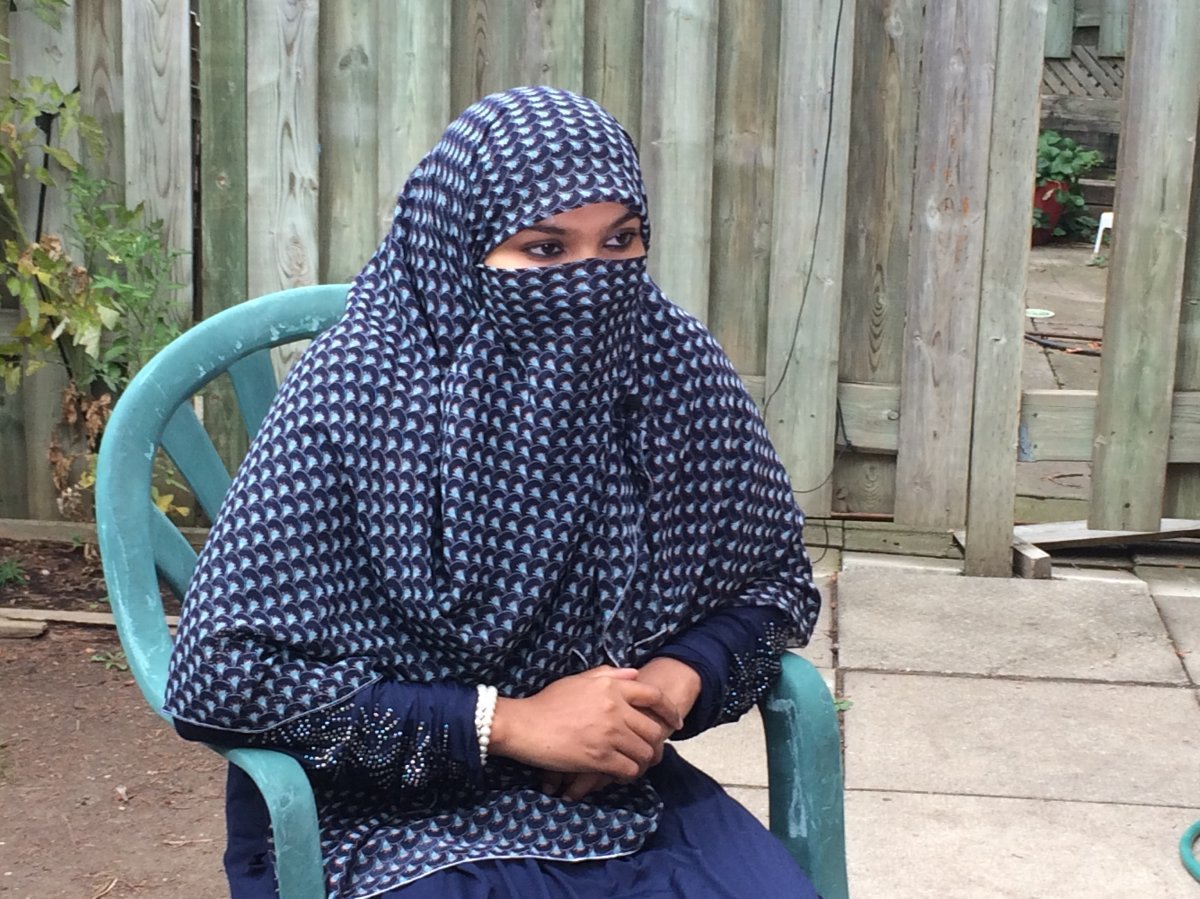OTTAWA – Stephen Harper’s proposed ban on the wearing of niqabs by anyone dealing with – or working for – the federal government ricocheted down the campaign trail Wednesday, drawing condemnation from opponents, premiers and Muslim groups.

He told CBC’s Power and Politics on Tuesday that, a re-elected Conservative government would look at legislation to nix niqabs in the public service – echoing similar comments last week in the French-language debate hosted by network TVA.
Harper then went further, saying the Conservatives are examining Quebec’s Bill 64, which requires Muslim women or others who wear face coverings to remove them if they want to work in the public sector – or do business with government officials. Although tabled in the Quebec National Assembly, the bill has yet to be debated.
On Wednesday, Harper praised the Quebec Liberal government’s measured approach and pledged that when it came time for federal legislation, he would follow their lead.
READ MORE: Ontario Premier says Harper is using the niqab debate to ‘divide’ Canadians
“I believe the Quebec government has been handling this controversial issue in a responsible manner and we will do exactly the same thing in Ottawa,” Harper said during a campaign stop in Saskatoon where he touted the Conservative plan to expand parental leave benefits under employment insurance.
As if to hammer home the point, the Conservatives released online attack ads in French Wednesday, going after Justin Trudeau’s position on the niqab.
- What is a halal mortgage? How interest-free home financing works in Canada
- Capital gains changes are ‘really fair,’ Freeland says, as doctors cry foul
- Ontario doctors offer solutions to help address shortage of family physicians
- Budget 2024 failed to spark ‘political reboot’ for Liberals, polling suggests
A proposed ban on niqabs in the federal civil service would affect an infinitesimally small number of bureaucrats – if any at all. Statistics from 2011 show only 1.8 per cent of 257,000 federal employees are Muslim women, and only a small subset of them is likely to wear face coverings.
The Conservatives have already tried to require Muslim women to show their faces at citizenship ceremonies, but those rules are being challenged in the courts. Harper’s comments on Wednesday make clear he is eyeing additional legislation to require women to unveil every time they want services from the federal government.
Harper insisted his government has been “saying the same thing for several months” on the issue.
While the prime minister may have been consistent in his comments that niqabs are contrary to Canadian values, that doesn’t mean members of his own cabinet are all on the same page about a wider ban.
Asked last spring whether the Conservatives would consider implementing similar measures to Quebec, federal Treasury Board President Tony Clement said the federal opposition to niqabs was limited to citizenship ceremonies.
“That is what the prime minister said and that is a point of view that one can hold,” Clement said on March 11, 2015. “That doesn’t mean that you can impose that view in the workplace or in the private sphere. The one place where I think we have a right and an obligation to stress Canadian values is in the act of obtaining one’s citizenship.”
Both Trudeau and NDP Leader Tom Mulcair condemned the latest proposal as an attempt to distract voters from serious questions about Conservative management of the economy.
Trudeau, in London, Ont. to tout the party’s proposed new Canada Child Benefit, said Wednesday Harper’s divide-and-conquer approach “is unworthy of the office he holds and he needs to stop because no election win (is) worth pitting Canadians against Canadians.”
Mulcair said what Harper was doing was “dangerous” and part of a broader political strategy aimed at getting the Conservatives re-elected by accentuating differences rather than bringing Canadians together.
“Stephen Harper is reminding us every time he does this why he doesn’t deserve to be prime minister,” Mulcair said as he highlighted the party’s $4.8 billion plan to improve aboriginal education.
WATCH: Reality Check: Why has the niqab become a pivotal election issue?
Ontario Premier Kathleen Wynne called the issue a “shocking” attempt to divide Canadians.
The National Council of Canadian Muslims says it’s upset Harper passed on a chance in the CBC interview to specifically condemn recent assaults against Muslim women, who appear to have been attacked simply because they wore head scarves.
“Canadian Muslims have noticed Mr. Harper’s choice of words and question whether he would have taken the same stance if these were bigoted attacks against other minority communities,” said the council’s executive director, Ihsaan Gardee, in a statement.
“We urge Mr. Harper to reassure Canadian Muslims and condemn Islamophobia and affirm that it has no place in Canadian society or in our political discourse.”
The niqab debate comes as a Liberal candidate in London, Ont., says divisive politics are to blame for the defacing of his election signs with ethnic slurs.
A photo posted online shows the words “ARAB scum” scrawled across one of Khalil Ramal’s signs.




Comments